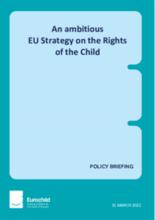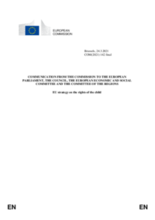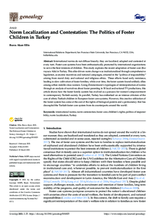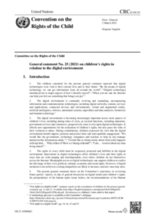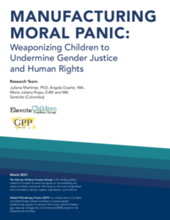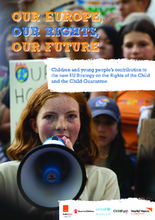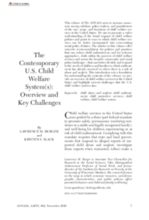Displaying 141 - 150 of 1798
The Ngulluk Koolunga Ngulluk Koort (Our Children Our Heart) project conducted extensive Elder and community consultation to develop principles and practice recommendations for child protection governance in Western Australia. The authors of this paper explore these principles and practice recommendations and highlight the need for culturally safe community consultation and governance with a focus on repairing damage incurred by the Aboriginal and Torres Strait Islander community from past child protection policies.
The article discusses two previously published articles by the author and two co‐authors, where the topics are the history of leaving care support in Norway and how the Nordic welfare model may represent a problematic frame for leaving care support.
The aim of this paper is to examine how a strengths-based approach facilitates working relationships between child welfare services and families.
This is a preliminary analysis of the new EU Strategy on the Rights of the Child was carried out by the Eurochild Secretariat.
This strategy’s overarching ambition is to build the best possible life for children in the European Union and across the globe.
This study explores the recent adaptation of foster care (Koruyucu Aile) in Turkey.
In the present general comment, the Committee on the Rights of the Child explains how States parties should implement the Convention on the Rights of the Child in relation to the digital environment and provides guidance on relevant legislative, policy and other measures to ensure full compliance with their obligations under the Convention and the Optional Protocols thereto in the light of the opportunities, risks and challenges in promoting, respecting, protecting and fulfilling all children’s rights in the digital environment.
This report explores how gender-restrictive groups are using child protection rhetoric to manufacture moral panic and mobilize against human rights, and how this strengthens the illiberal politics currently undermining democracies.
The perspectives and priorities of more than 10,000 children and young people, from within and outside the European Union (EU), are expressed powerfully throughout this report.
This introduction sets a foundation for understanding the contents of this volume of The ANNALS, which aims to increase awareness among scholars, policy-makers, and practitioners of the size, scope, and functions of child welfare services in the United States.

